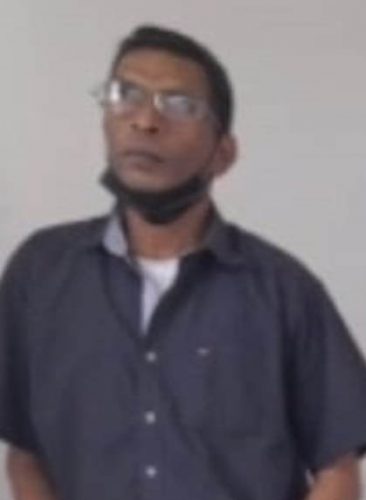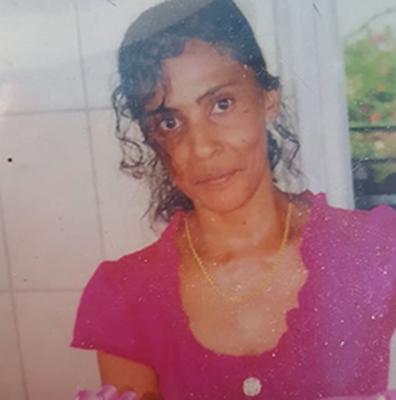Davanand Narine was yesterday morning sentenced to 18 years in prison for the 2019 stabbing death of his wife Farida Khayum, but following a number of deductions, will be spending just about the next seven years behind bars.
At his sentencing hearing yesterday morning, Narine who said he was sorry for his actions, told the Court that while it was difficult at the time “to walk away,” having had three years to reflect, that is exactly what he should have done.
“I could have walked away,” he said as his voice cracked.

In tears he then apologized to both his and the woman’s family, for what he described as the embarrassing disappointment he has put them through; but specifically to her three sons who he acknowledged putting through the pain of being motherless.
Narine had been originally indicted for murder.
Just over a month ago at his arraignment at the High Court in Suddie he, however, threw himself at the mercy of the Court, pleading guilty to the lesser charge of manslaughter.
The now 52-year-old former chainsaw operator accepted the indictment which stated that he unlawfully killed his wife on May 16th, 2019 at their Lot 9, Anna Regina, Esse-quibo, home.
“Is my wife…I love she…me is the cause,” Narine had said after entering his plea.
The case for the State had been that on the day in question, Narine and his wife were at home in their kitchen when an argument erupted.
Police had said in a statement that investigations revealed that Khayum was preparing to go to a nearby function, when the argument started.
It was during this time police said, that the man armed himself with a knife and stabbed Khayum about her body, including to her neck. The woman was subsequently rushed to the Suddie Hospital where she later died.
Following the stabbing, Narine was himself warded at the same hospital under police guard after lawmen said he had ingested an herbicide.
Khayum, 39, was a domestic worker.
In imposing sentence, Justice Jo-Ann Barlow said that having regard to both the aggravating and mitigating circumstances of the case, an appropriate base was 18 years.
Among the aggravating factors, the judge noted that the matter had its genesis in a domestic dispute, which she said cannot be condoned in any shape or form.
She noted, too, the weapon used and the some 15 stab wounds which Narine inflicted on the unarmed Khayum.
The judge said she also considered that not only was the victim attacked in what ought to have been the sanctity of her home, but in the presence of her youngest child who was just about nine years old at the time.
Justice Barlow then went on to underscore the immense role alcohol played in the events of the fateful day; referencing a probation report which presented Narine as being otherwise of good character, but for when he imbibes.
The Court said, however, that it found as mitigating factors; the offender’s “genuine” expression of remorse, his having no previous brushes with the law, and from both prison and probation reports, his potential for rehabilitation.
Justice Barlow said she was mindful of making a four-year deduction for these mitigating factors, but said that given the effect of the death on the children of deceased, which in their impact statements they spoke of still being unable to cope, the Court made only a two-year deduction.
To the 16 years remaining therefrom, the judge then gave Narine the full one-third credit reduction for accepting responsibility for his actions at the first-given opportunity, and further ordered that the prison make deductions for time he would have since spent on remand.
Given all the deductions, the offender has a remainder of just about seven years of incarceration.
As a means of providing what she said is hoped would be some degree of closure, Justice Barlow has also told State Counsel Tiffini Lyken to ensure that facilities for counselling are provided to the surviving children of the deceased.
The boys in their various victim impact statements spoke of their struggles with depression and poor academic performances among other things.
The court heard from the statements, that the young men continue to struggle emotionally and psychologically with the loss of their mother, with which they have been unable to come to terms.
Meanwhile, in her address to Narine, Justice Barlow urged him to continue the exemplary behaviour of which the prison spoke, and to make use of the services offered there to better himself.
She specifically singled out counseling for alcohol abusers.
She then urged that he should strive upon his release, not to be known as the man who killed his wife, but for his reform and as someone who can make valuable contributions to society.





